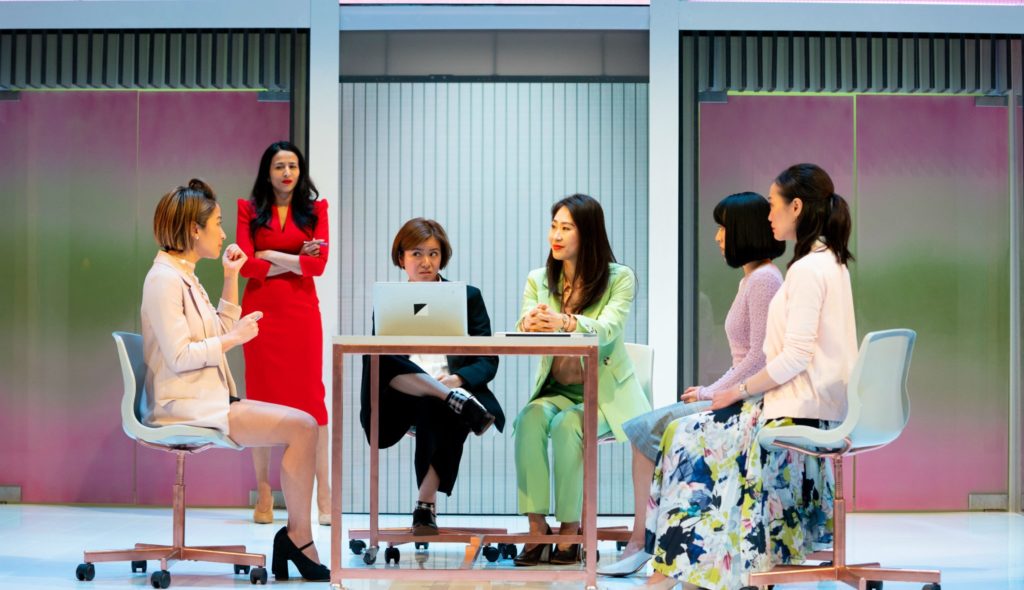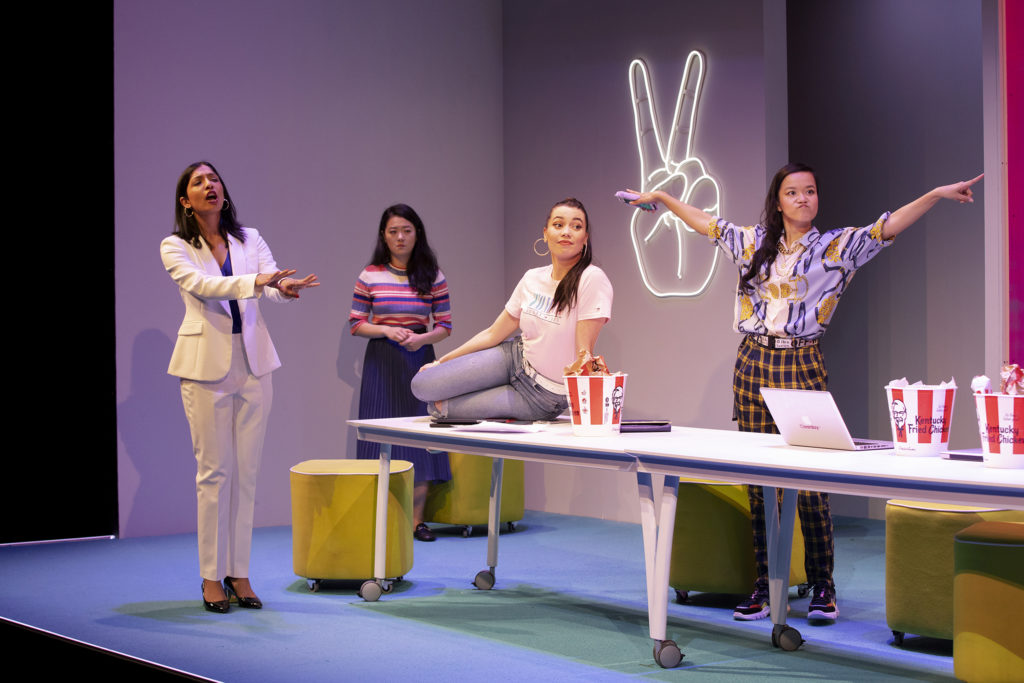White Pearl – I dare you to laugh

By Vaanie Krishnan
On Friday 1st April, I was lucky enough to score a last minute ticket to White Pearl at the Sydney Theatre Company. I have gone back and forth several times about whether to publish this article. Do I write an honest review? Or do I pander to the theatre community so that they might endorse my writing, invite me to their shows and create space for a diverse, critical voice? In the end, I decided that my value add is my perspective as a person of colour and truthfully, White Pearl was a really uncomfortable experience for me.

White Pearl is pitched as a satire about a cosmetic start up, Clear Day, based in Singapore written by Thai-Australian playwright Anchuli Felicia King and directed by Priscilla Jackman. In the first act we meet five young, ambitious women from across Asia who are working to promote and sell a new skin whitening cream. Priya (Manali Dara) the Indian-British CEO and founder of Clear Day, Sunny Lee (Melissa Gan), Priya’s Singaporean assistant, Soo Jin (Deborah An) the chemist and creator of the whitening cream White Pearl, Ruki (Mayu Iwasaki) the office manager and Japan regional manager and Xiao. When a racist ad gets leaked while still in development, chaos ensues as we learn more about each of the characters, their individual motives and beliefs, and the part they played in the leak. The actors do well to make the audience invested, Deborah An and Mayu Iwasaki in particular deliver nuanced comedic performances.
Written in 2016 and debuting in 2019, King has tried to do lot with White Pearl, sometimes too much. Her dialogue explores cancel culture, inter-asian race politics, anti-black sentiment in asian communities, domestic violence (and revenge porn), the cut-throat nature of the cosmetics industry and the way it preys on the insecurities of women. The dialogue is direct, fast paced and Jackman’s direction uses space, lighting, and delivery well to create a frenetic energy that gives the dialogue urgency and escalates the drama quickly, keeping the stakes high and the audience engaged.
King’s writing is bold and intentionally provocative but I have to wonder if it is justified. Some of the dialogue is vile, reminiscent of taunts I’ve heard on the playground, in the office, whispered behind my back. For me the play was visceral, not at all satirical and I did not find it funny, neither did the audience I was sitting with. With emerging voices and playwrights such as S. Shakthidharan (Counting and Cracking) and Jasmine Lee-Jones (7 methods) bringing nuanced points of view to the conversation around race. White Pearl lacks a specificity that relegates the characters to caricatures of well known stereotypes and teaches you very little in the process. What makes it problematic is that King has not written about her own experience or heritage, which is suspiciously lacking from the stage. This makes her commentary on race feel voyeuristic and generalised. The racist dialogue, damaging and unconstructive.
The play hits peak discomfort as Priya, the British-Indian CEO of Clear day (played brilliantly by Manali Dara) becomes more and more frenetic. It feels cruel (if intentional, ignorant if not) that King made the most “crazy” character the darkest person on the stage, a reflection in itself of the plays anti-black sentiment. Art and theatre has always used provocation to entice and entertain the audience – but to what avail? At what cost? Is it justified if it does not progress us forward?
White Pearl is coming back to the Riverside’s National Theatre of Parramatta in May.
On Sunday 27th March at 6:30pm I had the privilege to do what many married 30 year old’s do these days, drag my husband to a play. Darlinghurst Theatre Company’s progressive 2022 program had blown me away once already with 7 Methods of Killing Kylie Jenner, leaving me with high hopes for Stay Woke, the second play by Melbourne-born playwright Aran Thangaratnam.
Walking into the Eternity Playhouse, I was met with the familiar scents of cinnamon, clove and cumin. An ode to South Asian culture rarely found in the walls of traditional theatre. For many second-generation South Asians, that spent their primary and high school years running from their native smells to fit in, this felt triumphant. A true example of what can happen when you create space for the specificity of culture, one that does not group all people of colour together.
Vaanie Krishnan writes reviews on her blog, do check: https://thetheatreenthusiasts.wordpress.com/
Short URL: https://indiandownunder.com.au/?p=17803
